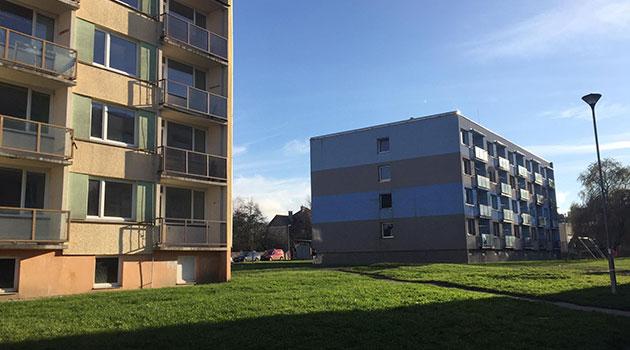Czech town provides no aid as Romani families are made homeless during COVID-19 pandemic

The very last Romani family still living at the housing estate on Kovářská Street in the Czech town of Varnsdorf has now ended up homeless. The owner of the apartment units where they had been living evicted them at the beginning of January.
The family of five will not be allowed to lease a municipally-owned apartment despite previous promises by Mayor Roland Solloch (ANO) to rent them one, even though both the father and mother of the family have been employed by the town itself for several years and cannot be considered rent defaulters by any stretch of the imagination. Some of the units on Kovářská Street, which has a bad reputation among locals, were bought during the second half of 2020 by the entrepreneur Lukáš Rak, who reportedly wants to reconstruct the prefabricated apartment buildings.
Rak is the CEO of the Butterfly Factory s.r.o. company, which according to property records currently owns many units in that locality. During the summer he evicted tenants who were behind on their rent and utilities payments, and during the autumn he gradually also evicted even those who owed no such debts.
It had seemed that at least one family might not encounter that same fate thanks to Mayor Solloch, who had promised to aid them. Tenant Iveta Balážová works for the municipality as a housekeeper, while her husband has worked for Technical Services for 15 years in Varnsdorf.
Solloch previously told news server Romea.cz that the couple are trouble-free employees whom he values. Last week, however, the situation absolutely changed for them.
The couple and their three children have left the apartment unit on Kovářská Street for good and are now homeless. The mayor has allegedly stopped communicating with them, cannot be reached, and has not kept his promise to give them a helping hand.
The mayor’s first proposal of a possible way out was short-term accommodation at the municipally-owned TGM residential hotel, which according to locals does not meet hygiene requirements and is not a long-term solution to the problem of housing for the evicted families. A local resident named Ms Hučková, who is renting a house near the railway not far from the small housing estate, has temporarily offered a helping hand to the Baláž family, as she did to three other evicted families before them.
“If Ms Hučková hadn’t given us aid, we actually would have ended up on the street. The town constantly kept promising us that we just had to wait another week, then another 14 days, then another week – and there was no change all that time. When it seemed we finally would have to move, the information came from the town that they could just offer us accommodation at their TGM residential hotel. If we hadn’t reached an agreement with Mr Rak to let us stay in the apartment because the town leadership had promised us a municipal unit, we would have ended up on the street even before then,” Balážová, who has been on disability for seven years with a diagnosis of polio, told news server Romea.cz.
“We appealed to the town leadership that we actually cannot afford to pay CZK 15 600 [EUR 600] per month to live in the residential hotel, even though we both work. We simply would not be able to make ends meet. However, as you can see, that was to no avail,” the evicted woman said.
The town’s TGM residential hotel charges CZK 121 [EUR 4.62] per day per adult and CZK 60 [EUR 2.29] per day per child. According to locals, the facility is in a desolate state, and the monthly cost to accommodate families or individuals in crisis and in need of housing there is high.
“Once you have something like [having lived on a street like] Kovářská in your past, you will never find housing anywhere else. For the last six years I have been doing my best to relocate us, but I have not managed to do so. You have to take into consideration the fact that my husband and I both work and do our best to function absolutely normally, and then they want us to find housing elsewhere within a matter of a couple of weeks, and they provide us no aid whatsoever with that. I was also annoyed that some problematic families were living at the housing estate, but it never occurred to me that we would all pay a price for it,” Balážová lamented.
Most of the evicted families initially found housing outside of Varnsdorf, but some returned to the town and are currently living at the TGM residential hotel. Four families, including Ms Balážová’s, have found temporary asylum with Ms Hučková.
The families are practically unable to relocate because they encounter discrimination on the rental housing market. “This is difficult for me, but I’m hanging in there for the time being. The mayor is not communicating with us, he constantly excuses himself by saying he has meetings or is out of town. So for the time being we are waiting, but this waiting has lasted four months already,” Hučková told news server Romea.cz, adding that she cannot leave the families on the street to freeze.
“The children would have to go live in orphanages and their parents would remain on the street. The mayor recently told me that while they have apartment units available, they are not designated for families that have lost their housing, but for ‘homeless people’. I pointed out to him that they are currently homeless and have nowhere else to go, but to no avail,” Hučková said.